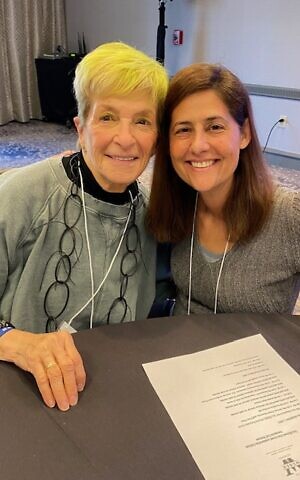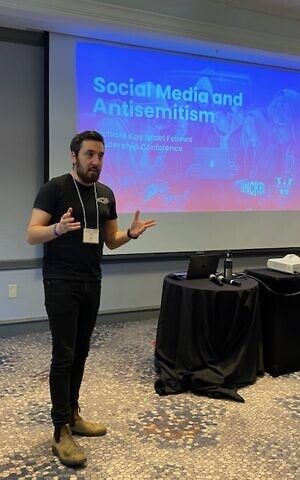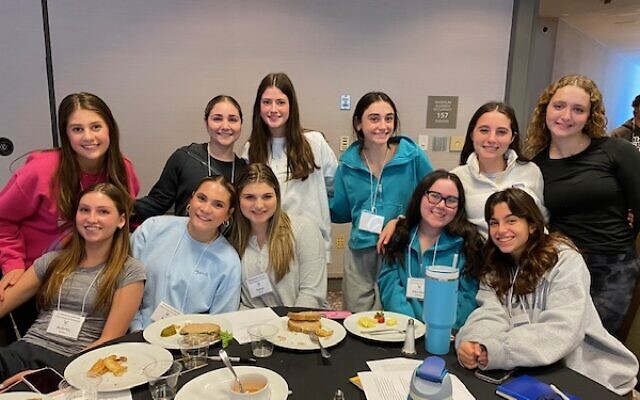Weber Launches Israel Leadership Fellows Program
The Michael Kay Israel Leadership Fellows Program will educate the students on various issues surrounding Israeli society today.
The Weber School launched the Michael Kay Israel Leadership Fellows program this month with an inaugural two-day, off-site retreat jam-packed with educational seminars designed to provide a deep understanding of the history and current issues facing Israel and Zionism.
Rabbi Ed Harwitz, head of school, first conceived of the idea for an Israel Fellows program years earlier. His goal was straightforward: develop teams of dedicated, knowledgeable students who are able to quickly assume leadership roles on their future college campuses and speak knowledgeably about the complex and challenging issues surrounding Israel. According to Rabbi Harwitz, Weber has worked to build a deep and abiding relationship between its students and the land and people of Israel since the school began 26 years ago.
“The students in the Israel Leadership Fellows program will be able to articulate a clear and compelling case for Israel, not just defensively, but in a proactive and constructive manner when they arrive on college campuses. Even before Oct. 7, we knew there were many challenges at American colleges. Now the need is even greater,” said Rabbi Harwitz.

In light of the brutal terrorist attacks on Oct. 7, school administrators quickly made a decision to adapt the sessions they had planned to address the current state of affairs in Israel, the United States and across the world. Topics included the Israel-Gaza conflict, terrorism, the rising tide of antisemitism and the impact of social media. The film, “Upheaval: The Journey of Menachem Begin” was screened on the opening night of the retreat, followed by an impactful discussion about leadership.
Eighty sophomores, juniors and seniors attended the retreat and heard from speakers as a large group and in smaller breakout sessions. The Israel Fellows program will be three years long and confer an honors-level diploma distinction when participants graduate. The program has been designated as one of the school’s Centers of Excellence and was born from the belief that education about Israel, particularly now, is not only important, but necessary.
Educators at Weber emphasize that their goal is not to offer a set of talking points, but rather “to provide an education grounded in rigor that enables students to engage thoughtfully in meaningful discussions about Israel.”
“Many Jewish students do not feel comfortable discussing topics related to Israel on college campuses. Our goal is to empower them, so they feel good about educating others. We want our students to understand Israel’s history and what is currently taking place. We hope they will see themselves as an integral part of the next chapter. We need them as our future leaders — and we want them to feel the love, care and devotion for Israel that is informed by knowing the facts,” said Bernadette May Beaver, Director of Israel and Global Education, who will be spearheading the program.

At the recent retreat, students were engaged and eager to learn. The updated curriculum was developed by Unpacked for Educators, a division of OpenDor Media, and the sessions were led by educators from their team. OpenDor Media is a nonprofit organization that produces feature-length films, videos, social media content and educational resources designed to appeal to modern tastes. The materials are distributed worldwide with the goal of educating audiences about Israel and Jewish topics. All sessions during the retreat were interactive, and students were provided additional time for verbal and written reflection on the subjects presented.
“Teens are curious and hungry to learn. They are passionate and want to be sure their voices are heard. We want to be certain these students have informed narratives. Our program is not an advocacy campaign for Israel, but rather an educational program,” stressed Noam Weissmann, executive vice president of OpenDor Media. “Education leads to serious thinking and is long-lasting. Advocacy without education is shallow,” he added.
Another component of the Israel Leadership Fellows program is its partnership with One2One. Through a series of individualized Zoom calls, spread out over several months, One2One allows each Weber teen to partner with a counterpart in Israel to explore ideas like Jewish peoplehood and human rights, while also discussing shared interests and engaging in cross-cultural dialogue. The meetings have already begun with the Weber teens wholeheartedly embracing the concept, especially meeting new friends.
Funding for the Israel Leadership Fellows program was provided by a generous grant from Ann Kay and the family of Michael Kay. Kay, z”l, was a philanthropist and a visionary who, with his wife, Ann, had a significant impact on The Weber School and the Atlanta Jewish community. The Michael Kay Israel Leadership Fellows program is both a tribute and a continuation of his legacy of service to Israel and the Jewish people.

Rabbi Harwitz has even bigger expansion plans for the Israel Leadership Fellows program. His goal over the next five years is to engage 10 other Jewish high schools across the United States to replicate the program. He believes the students can be on-campus educational ambassadors for Israel, as well as future Jewish community leaders.
“Armed with knowledge and clarity, these students will be our greatest beacons of hope to engage with others on behalf of Israel. And as the program expands to additional high schools, imagine more than 800 of these students, dispersed at universities across the United States. We can have a significant impact in educating others about Israel and combatting antisemitism,” he said.
And if the enthusiastic feedback from the students at the retreat is a measure, they are just as passionate about the program as their teachers and administrators.
“With everything going on in Israel, it is so powerful that we have sessions like these to gain knowledge and insight,” said Ari G.
According to Elliot F., “It’s important to learn more about these topics since there is so much misinformation out there. Jewish voices are needed now.”
And Hannah C. said, “Learning other perspectives has been eye-opening and changed my entire view of the conflict. I have learned we can be pro-Israel and not anti-Palestinian.”
The Michael Kay Israel Leadership Fellows will have another retreat in the spring of 2024, as well as educational sessions throughout the year. Upcoming topics will include a focus on the diversity of thought among Zionist thinkers, including the distinction between Political and Labor Zionism, Revisionist Zionism and Religious Zionism. The first session will focus on the philosophy of leaders Theodor Herzl, David Ben-Gurion, and Golda Meir. According to May Beaver, the goal is to expose students to a diverse array of Zionist thinkers whose impact continues to shape Israeli politics, identity, and culture.
In closing the inaugural retreat, Rabbi Harwitz spoke of the future and expressed his profound appreciation for all who helped make the Michael Kay Israel Leadership Fellows program a reality.
“This is only the beginning. Israel and the Jewish people need you,” he exuberantly shared with a group of students who seemed eager to learn and make their mark on an increasingly changing world.




comments